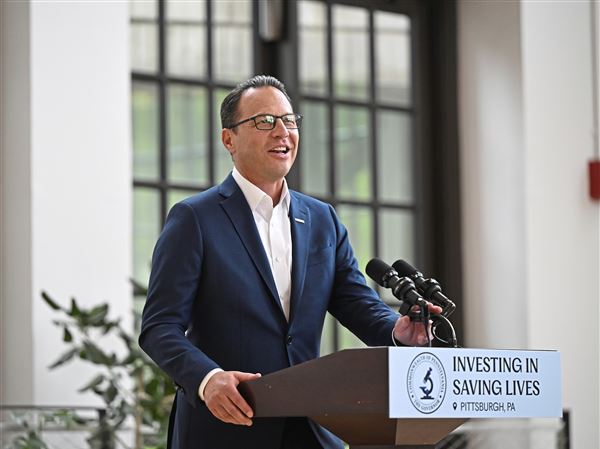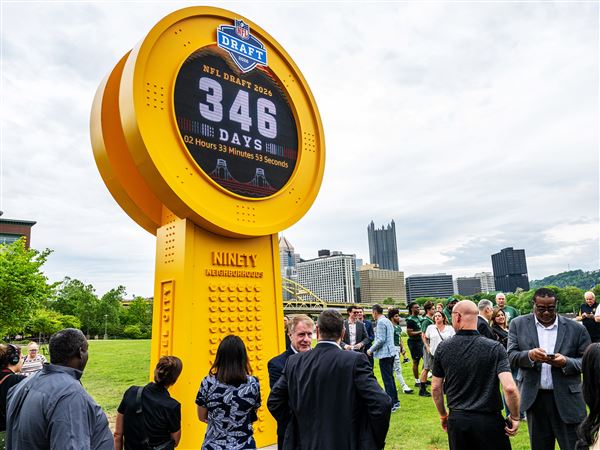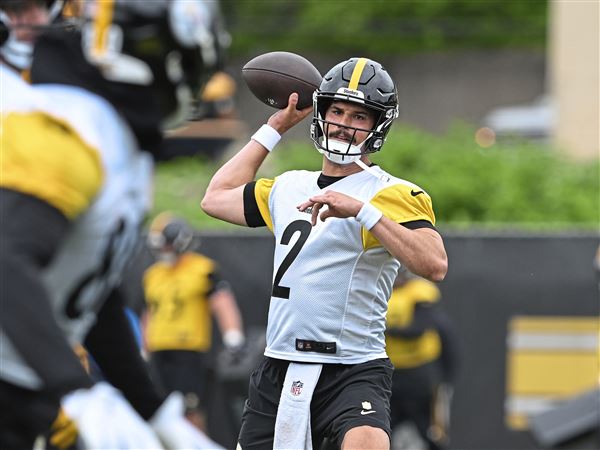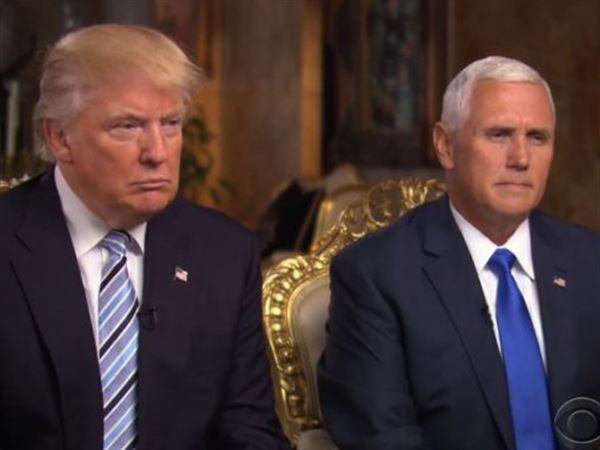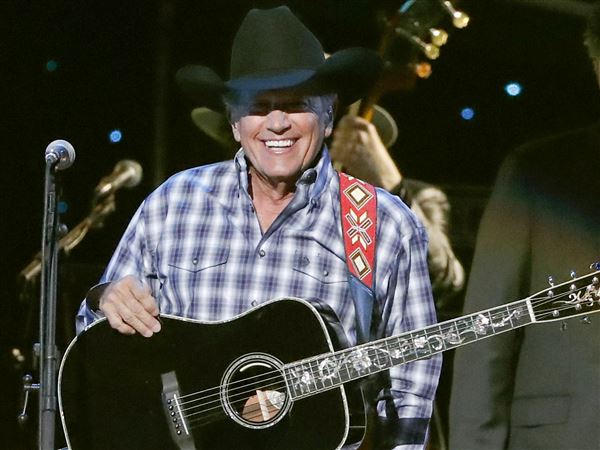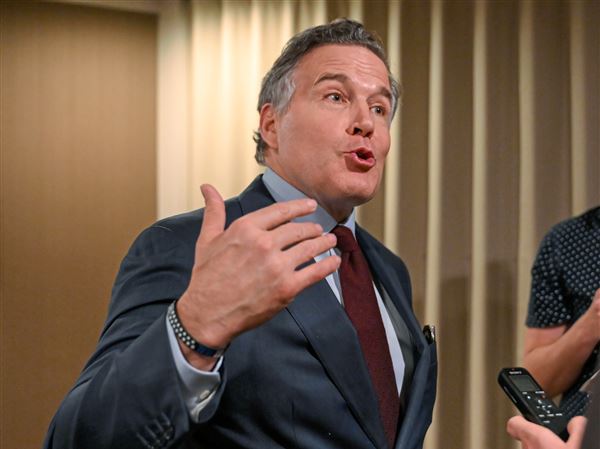HERSHEY, Pa. -- Richard Trumka is right and he will not be moved.
The president of the AFL-CIO is standing atop a long flight of stairs during a shift change at the Hershey chocolate plant, handing out leaflets to workers, putting his burly arm on their shoulders and goading them to support the union-endorsed slate of candidates on Election Day.
A security guard approaches with word that he can't do this on company property. Not so, Mr. Trumka says, whipping out his cell phone to call the Hershey chairman of the board -- who had given his approval for the afternoon's leafleting. His small entourage of folks from the local Chocolate Workers Union and state AFL-CIO gather. "Don't you know who he is?" one asks.
Nope. The guard takes down Mr. Trumka's name and organization, and the nation's most powerful labor leader calmly explains the acronym: "American Federation of Labor and Congress of Industrial Organizations."
Yet within three minutes, Mr. Trumka and the security guard -- an affable Brit, it turns out, named Reggie Henderson -- are talking like old chums about hidden corners of England.
Mr. Henderson walks away; Mr. Trumka, campaign literature in hand, stays put. "Organizers know how to do that," Mr. Trumka says with a wink.
If the Democrats still control Congress Nov. 3, they'll owe some credit to the linebacker and coal miner from Nemacolin, Greene County, who can give a simultaneous stiff-arm and embrace. Mr. Trumka, running a sophisticated nationwide campaign to turn out union voters for Democratic candidates, exudes a constant confidence that he is right and he will prevail.
Three to four times a week during this final stretch before the midterm elections he greets the lunch-bucket crowd outside a union work site. The workers for the most part don't know who he is, but Mr. Trumka would rather them know gubernatorial candidate Dan Onorato and U.S. Senate hopeful Joe Sestak.
Back in Washington, Mr. Trumka, 61, stocky and mustachioed, is relaxing on the balcony outside his eighth-floor office at the AFL-CIO when he's asked whether Pennsylvania's races hold a special significance for him.
"Hello?" he responds, a one-word rhetorical he often employs when the answer is obvious.
"Of course ... . That's still home." His home life outside of organizing includes wife Barbara and son Richard Jr.
•
Mr. Trumka's grandfather settled in Nemacolin from Poland and went to work in the coal mines. Like most of the men in town, Mr. Trumka's father followed suit.
But work was scarce in those days, and the mine where Frank Trumka toiled kept him on only one day a week -- but they would rotate which day. As Richard Trumka tells it, this meant that Frank Trumka couldn't find another steady job, nor could he earn a partial unemployment check, which required more than eight days without work.
Yet even in a household where dinner was potato soup one night and potato skin soup the next, Mr. Trumka never felt deprived. He emphasized the good times: hunting or picking berries with his father on the frequent days that Frank Trumka wasn't working, Sunday dinners at his grandparents' farmhouse, the palpable sense of community.
"Everybody in town kept an eye on you," Mr. Trumka said of the place he still returns to for hunting and fishing trips and where he plans to retire. "When you were doing stupid stuff, they'd stop you."
Labor unions were part of the family identity. Frank Trumka spent 44 years in the United Mine Workers, like most of the male family members, while many of the Trumka women were unionized teachers.
Richard Trumka played linebacker for Carmichaels Area High School, where old friend -- now special assistant to Mr. Trumka at AFL-CIO -- Rich Barchiesi described him thusly: "I wouldn't say he was fearsome, but he was a good ballplayer, aggressive."
He wanted to walk on at Penn State, but a knee injury ended his football career. "It was the best thing that ever happened to me," he said.
He worked in the Nemacolin Mine for half the year -- occasionally taking classes at a Penn State branch campus -- and spent the rest of the time at State College, still graduating magna cum laude in 1971. Mr. Trumka earned a law degree from Villanova University, outside Philadelphia, in 1974, then became a lawyer with the UMW.
One moment in those early days particularly struck him. After his first successful organizing drive, a miner in his 50s, his hands rough from a laborer's life, approached Mr. Trumka with tears in his eyes and said, "I'll never have to beg again." Recounting the story, Mr. Trumka's eyes welled up, too.
A natural leader, Mr. Trumka took quickly to organizing and advocacy -- and union politics. He was just a fiery 33 years old when he won election as president of the UMW in 1982.
Seven years later he faced his toughest test.
Pittston Coal Co. set up a confrontation with the union by pulling out of the Bituminous Coal Operators Association -- which at the time negotiated blanket contracts with the UMW. As the union and management sparred over the company's plans to cut health and pension benefits for retired miners, Mr. Trumka traveled the country, rallying support from the rest of the labor movement, as well as from civil rights and religious groups.
The union then went on strike, a 101/2-month struggle in which thousands of workers were arrested for civil disobedience; UMW faced millions in fines and a potential seizure of its treasury by the courts.
Mr. Trumka didn't back down.
"The thought was, if the strike was broken there would be devastating losses to follow in the hills -- not just for the mine workers, but defeats would have also continued in organized labor," said Cecil Roberts, then Mr. Trumka's vice president and now the president of the UMW.
The two sides eventually came to an agreement, which was soon followed by the 1992 Coal Act, a bill that guaranteed health benefits and pensions for miners even if their company went under. Those two victories, Mr. Roberts said, were the highlights of Mr. Trumka's 13-year stewardship of UMW.
In 1995, Mr. Trumka became secretary-treasurer -- the No. 2 position -- at AFL-CIO under John Sweeney, the mild-mannered former head of the Service Employees International Union. He was elected president in September 2009, upon Mr. Sweeney's retirement, and set out to remake the federation in his pugnacious image.
He reached out to younger workers and brought in nonunion allies to help advance the federation's agenda, acknowledging that unions had been slow to adapt to the remaking of the American economy as manufacturing declines.
And he threw himself into the cauldron of Washington policymaking.
•
The timing was fortuitous, as Mr. Trumka arrived a few months after the newly labor-friendly President Barack Obama took office, and just as the tea party movement found its legs as a foil across the ideological spectrum.
After never setting foot in the Bush White House, AFL-CIO executives have been West Wing regulars. Mr. Trumka serves on the president's Economic Recovery Advisory Board and often gets face time with the president -- including a joint trip to Milwaukee for a rally on Labor Day.
Mr. Obama's deputy chief of staff, Jim Messina, said Mr. Trumka frequently derides the overly intellectual talk among the president's economic advisers and pushes the conversation to what will deliver jobs to the working class.
At the same time, he's no intellectual lightweight. Though he looks like a football coach and can whip a crowd into a frenzy, Mr. Trumka often sounds like an economics professor as he describes the squeeze on the middle class in recent decades -- a period coinciding with declining unionization.
Mr. Messina recalled a recent West Wing meeting in which Mr. Trumka, praising Mr. Obama's infrastructure spending plans, rattled off state-by-state unemployment statistics. Mr. Messina checked Mr. Trumka's numbers, and they were all correct.
Reflecting on his first year at the helm, Mr. Trumka said the biggest difference is that the AFL-CIO "is right in the middle of every economic debate on every important issue that's out there right now. And we weren't there before."
His counsel also was sought on the signature legislative achievement of the Obama administration: health care reform.
Although most collectively bargained workers have some sort of health coverage, Mr. Trumka saw universal health insurance as a crucial fight for the working class and launched into the debate.
But he wasn't always an administration cheerleader. Mr. Trumka was upset when the "public option" government insurer was dropped and furious when a proposal surfaced to help pay for the bill by taxing expensive "Cadillac" health insurance plans, which many unions had collectively bargained instead of higher wages.
Upon learning of the proposal, Mr. Trumka gave Mr. Messina an unprintable tirade over the phone, but Mr. Messina told him the bill couldn't pass without some version of the tax. So Mr. Trumka and other labor leaders met with administration officials in the White House for more than 12 hours -- staying well past midnight -- to work out a scaled-back compromise one January night.
When Mr. Obama signed the finished bill, Mr. Trumka, tears streaming down his face, turned to Mr. Messina and said "We did good, Jimmy."
Ask Mr. Trumka about the legislative successes of his first year of rallying and cajoling in Washington and he'll recount health care, Wall Street reform and economic recovery with pride. But the top item on labor's agenda, the Employee Free Choice Act, has languished.
The Senate has not taken up the bill, which is designed to make it easier for unions to organize and known as "card check" for a provision allowing employees to sign cards to form a union rather than the traditional secret ballot. And with Republican gains likely in this election, it seems unlikely that the bill will advance anytime soon.
Mr. Trumka offers only a coy "stay tuned" when asked about the legislation, noting that "the year isn't over yet." But in a post-election lame duck session, the Senate is scheduled to take up a nuclear treaty with Russia, the extension of the Bush tax cuts and the yearly spending bills.
"Anything that is controversial, politically contentious, is probably not going to be considered," Sen. Richard Durbin, D-Ill., the chamber's second-ranking Democrat, said in an interview last week.
It's one of the reasons Mr. Trumka, along with many people across the country, is frustrated with Washington.
"They say the older you get the more patience you have -- not true with me," he said. "The older I've gotten the less patience I have with people that don't want to do anything, that want to stop everything, any progress."
•
One of the few Washington power broker traits Mr. Trumka embraces is workaholism. He gets about four hours of sleep a night and is typically in his office, a stone's throw from the White House, by 6 a.m.
As Election Day draws closer, his schedule is increasingly dominated by politics.
Outside groups have flooded this election season with cash, including a pledged $65 million from the new Karl Rove-backed American Crossroads, and a planned $75 million from the U.S. Chamber of Commerce.
AFL-CIO, of course, is well-stocked financially, though a spokesman declined to reveal how much the federation plans to spend on the midterms. AFL-CIO member the American Federation of State, County and Municipal Employees is spending $87.5 million on the elections, though that is not part of the AFL-CIO efforts. But as opposed to the television campaigns of many outside groups, the AFL-CIO doesn't do much mass media.
During election season, Mr. Trumka said, each union member will get an average of 25 "touches" -- a phone call or a leaflet, for example -- all nudging them to vote for the union-backed candidates. In Pennsylvania, that's Mr. Onorato, Mr. Sestak, Democrats in nine competitive U.S. House races in which AFL-CIO is sending out mailings, and local races.
This spring, the results of the union program in Pennsylvania were mixed. Rep. Mark Critz, D-Johnstown, prevailed in a closely watched special election in a district with more than 100,000 union voters, but the victory was also helped by competitive primaries at the top of the ballot that drew more Democrats to the polls. Meanwhile, union-backed Sen. Arlen Specter lost his primary to Mr. Sestak -- though union leaders said supporting the candidacy of the former Republican fell flat with many of their members.
For the fall races, field efforts began in July. According to a memo by AFL-CIO political director Karen Ackerman, they have pushed the union vote in a more Democratic direction. For example, Mr. Sestak's union support moved from 45 percent-39 percent on Labor Day to 55 percent-26 percent by mid-October.
"Rich Trumka is a strong, hard-nosed guy," said Bill Miller, the political director for the Chamber of Commerce, which is strongly backing Republican Pat Toomey in the Pennsylvania Senate race.
"We don't agree with a lot of what he thinks in terms of turning the economy around, but we respect him and respect that organization because there are times when we work together. But in the political space, he is a worthy adversary."
A few beads of sweat form on the adversary's brow as he stands at the front of the group handing out literature in Hershey. Addressing them as "brother" and "sister," Mr. Trumka grabs as many workers as he can, tossing fliers into workers' bags if their hands are full.
"Benny, if you were getting paid by the leaflet you'd be hungry tonight," Mr. Trumka calls out to an aide, Ben Waxman, whose pile of literature has not dwindled during their 20 minutes outside the plant.
He's only half kidding. There's work to be done.
First Published: October 24, 2010, 8:00 a.m.
